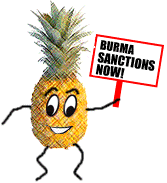Thursday, April 13, 2006
Human Rights Abuses in Burma (part 3)
‘Methods of control’- Burmese authorities impose their will on the people through a variety of human rights abuses. Torture, both physical and psychological, is routinely used in order to interrogate or punish political opponents or suspected ‘dissidents’,
“I received several severe electric shocks. The authorities pierced the flesh around my wrists with a strop of wire and then coiled the rest around my handcuffs. They then slowly began turning the generator until I began to shake uncontrollably and involuntary spasms contracted my muscles. The authorities would gradually increase the speed with which they turned the generator until the current was such that my whole body was thrown clear across the room. This continued for ten times each day” [1]. This account from just one political prisoner demonstrates the routine torture by the authorities in Burmese jails. Long prison sentences for actions such a free speech are also commonplace as demonstrated by the hundreds still in jail for their part in the 8888 protests; Amnesty International currently estimates that there are approximately one thousand one hundred political prisoners facing harsh prison conditions and subjected to cruel and inhumane treatment.[2] The military oppression and massacres of those taking part in protests also demonstrates the barbaric violence which the regime use to impose their will upon the country.
Psychological intimidation through the use of such methods as ‘the pitch-black cell’ are common, a prisoner suffering such fate described the conditions,
“When they closed the door, there was no light…Furthermore there was no bamboo bat, no blanket and no chamber pot.”[3] This is just one form of torture used in cells by the regime, other cases frequently demonstrate prisoners being forced to live in their own feces or subjected to homosexual rape by soldiers[4].
The families of political ‘dissidents’ and others the regime deems to be ‘undesirable’ are also used in intimidation. From children being refused education to women being raped the regime has demonstrated how it is prepared to go to any lengths to maintain its control. In January 2006 four year old Ei Po Po became the youngest political detainee in the world when the regime arrested her is response to her fathers peaceful support for Aung Sung Suu Kyi. Extra-judicial executions occur frequently as there is no separation between the regime and the judiciary. As well as hangings the amputations of limbs has also been used as a punishment.
These barbaric practices are illustrative of how, as well as being the only military regime in the world the SPDC is the worst human rights abuser in the world; and issue that must be addressed by the UN. Currently the Burma Campaign UK is raising money to send former political prisoners to Europe to give eyewitness testimony to governments in order to persuade the UN to take action, possibly one of the most worthwhile human rights campaigns to date.
[1] Burma Campaign UK
[2] Amnesty International/National Coalition Government of the Union of Burma (in exile)
[3] Burma Campaign UK
[4] Rebound 88
“I received several severe electric shocks. The authorities pierced the flesh around my wrists with a strop of wire and then coiled the rest around my handcuffs. They then slowly began turning the generator until I began to shake uncontrollably and involuntary spasms contracted my muscles. The authorities would gradually increase the speed with which they turned the generator until the current was such that my whole body was thrown clear across the room. This continued for ten times each day” [1]. This account from just one political prisoner demonstrates the routine torture by the authorities in Burmese jails. Long prison sentences for actions such a free speech are also commonplace as demonstrated by the hundreds still in jail for their part in the 8888 protests; Amnesty International currently estimates that there are approximately one thousand one hundred political prisoners facing harsh prison conditions and subjected to cruel and inhumane treatment.[2] The military oppression and massacres of those taking part in protests also demonstrates the barbaric violence which the regime use to impose their will upon the country.
Psychological intimidation through the use of such methods as ‘the pitch-black cell’ are common, a prisoner suffering such fate described the conditions,
“When they closed the door, there was no light…Furthermore there was no bamboo bat, no blanket and no chamber pot.”[3] This is just one form of torture used in cells by the regime, other cases frequently demonstrate prisoners being forced to live in their own feces or subjected to homosexual rape by soldiers[4].
The families of political ‘dissidents’ and others the regime deems to be ‘undesirable’ are also used in intimidation. From children being refused education to women being raped the regime has demonstrated how it is prepared to go to any lengths to maintain its control. In January 2006 four year old Ei Po Po became the youngest political detainee in the world when the regime arrested her is response to her fathers peaceful support for Aung Sung Suu Kyi. Extra-judicial executions occur frequently as there is no separation between the regime and the judiciary. As well as hangings the amputations of limbs has also been used as a punishment.
These barbaric practices are illustrative of how, as well as being the only military regime in the world the SPDC is the worst human rights abuser in the world; and issue that must be addressed by the UN. Currently the Burma Campaign UK is raising money to send former political prisoners to Europe to give eyewitness testimony to governments in order to persuade the UN to take action, possibly one of the most worthwhile human rights campaigns to date.
[1] Burma Campaign UK
[2] Amnesty International/National Coalition Government of the Union of Burma (in exile)
[3] Burma Campaign UK
[4] Rebound 88




